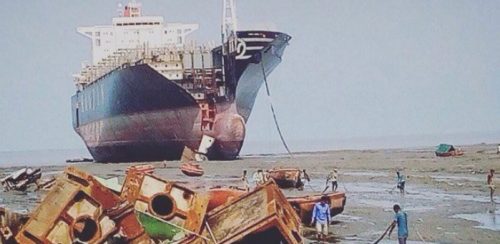The unsafe shipbreaking yards on South Asian beaches have claimed the lives of 19 workers so far this year, the NGO Shipbreaking Platform said in its quarterly update.
According to the coalition campaigning for clean and safe ship recycling, a total of 122 ships were broken in the third quarter of 2019.
Of these, 73 ships were sold to the beaches of South Asia.
Between July and September alone, eleven workers lost their lives and twenty were severely injured when breaking ships in Bangladesh and India, according to the report.
In Bangladesh, seven workers died in four separate incidents. Following one of the accidents, the country’s government imposed a three month ban on the import of end-of-life vessels on the yard, and has demanded that safety measures are taken.
The Platform added that the circumstances of two additional fatalities at the yards in Bangladesh this quarter still remain unclear.
According to Indian media, two workers died on the shipbreaking beach of Alang in the last quarter. Two separate accidents took place at scrapping yards that have applied to be included in the EU list of approved ship recycling facilities and are promoted by the industry as “safe and green”.
According to the Platform, Japanese, American and Greek ship owners sold the most ships to South Asian yards, followed by Indonesian and South Korean owners, in the third quarter of 2019.
Almost half of the ships sold to South Asia this quarter changed flag to the registries of Comoros, Gabon, Palau and St. Kitts and Nevis just weeks before hitting the beach. These flags are not typically used during the operational life of ships and offer ‘last voyage registration’ discounts. They are particularly popular with the middlemen that purchase vessels cash from ship owners, and are grey- and black-listed due to their poor implementation of international maritime law. The high number of flag changes at end-of-life seriously compromises the effectiveness of legislation based on flag state jurisdiction only, such as the EU Ship Recycling Regulation.
Criminal investigations have been launched by authorities in Europe following Platform alerts of imminent illegal exports of toxic end-of-life vessels. The case of the ferry Sir Robert Bond is, however, illustrative of the Canadian government’s lack of action. In the last two years, the ship was bought and sold several times: from the Canadian government to a peat moss producer in New Brunswick, to an agent in Quebec, who allegedly sold it for scrap to Indian breakers. In May, the Platform alerted competent authorities about the imminent illegal export of the vessel to South Asia from Canada. Despite authorities having been informed, the owner managed to illegally tow the unit to Alang, where it was beached a few weeks ago.

